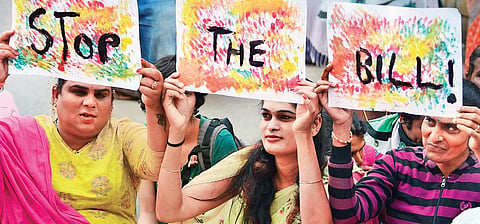

BENGALURU: The Transgender Persons (Protection of Rights) Bill was proposed in the parliament in 2014 with the purpose of protecting the rights of the trans community. Fours years on, the Lok Sabha has made 27 amendments and passed the bill on December 17, and yet, the community doesn’t feel ‘protected’ by it. It has been met with objection and protests by transgender rights activists, human rights activists and the entire community at large. They claim that the right to freely identify one’s gender, which was granted to the citizens by the Supreme Court in the 2014 NALSA judgement, has also been snatched away from them. Labelling the bill as undemocratic, the community claims it was passed without any consultation or consent.
Giving the power to identify the gender to a third party, the bill brings in a screening committee, which will after assessment, identify and certify those who wish to be acknowledged as trans. By restricting genders within the binary understanding of male, female and the other, the bill fails to understand and encompass the nuances that exist within the trans community. Activists claim that the bill also assumes that when a person decides to be attributed as either, they undergo a sex reassignment surgery.
Instead of providing the rights and protection that the bill was intended for, it takes control over their identity and body. Outraged at this, Akkai Padmashali, prominent transgender rights activists, said, “I decide my gender and my identity, they cannot decide it. When you don’t find the need to assess the gender of a man or woman, why do you need to identify the gender of a trans person? This is a transphobic bill.”‘If begging is criminalised, what option do we have?’
“You cannot criminalise a community based on their profession. You don’t want to talk about the alternative option (to begging), but you want to talk about digital India and Swachh Bharat. In the name of all this, you cannot sarvanash (destroy) Bharat. You can’t sarvanash our lives,” said Padmashali.
They claim that once the anti-trafficking bill is passed, their means of livelihood, begging and sex work will be affected. “The bill is criminalising the hijra system and the begging system. But here, begging is a cultural system. It’s not the regular begging, it’s a different kind of livelihood for them,”explained Rumi Harish, a transgender rights activist.
Nishagulur, human rights activist, said, “In the trafficking bill, there is no distinction between the cultural sex work and traffic sex work. And sex work is not criminal in India, but there is no clarity between forcible sex work and consenting, adult sex work. Male to female is only recognised.” She further added, “This bill not only affects sexual minorities but other oppressed communities too, such as construction workers and labourers.”
The bill also points to how if a trans person does not choose to stay with the family the person is born in, that they should be sent to a rehabilitation centre. Opposing the idea, Nishagulur said, “We come out to our (Hijra) family at the age of 16 or 18. In the Hijra culture, we have a good system. The family system is there, where the seniors are there to take care. How can we go to a rehabilitation centre?”